
MUTATION RESEARCH-REVIEWS IN MUTATION RESEARCH
Scope & Guideline
Pioneering Innovations in Genetics and Toxicology
Introduction
Aims and Scopes
- Genotoxicity and Carcinogenicity Assessment:
The journal focuses on the evaluation of genotoxic effects of various agents, including environmental pollutants, industrial chemicals, and nanomaterials, and their implications for cancer development. This includes systematic reviews and meta-analyses that synthesize existing data to better understand these relationships. - Molecular Mechanisms of Mutations:
Research on the molecular basis of mutations, including the role of genetic and epigenetic factors, is a core area of interest. This encompasses studies on DNA repair mechanisms, the impact of specific mutations on cellular processes, and the implications for disease pathology. - Applications of Advanced Genomic Technologies:
The journal highlights the use of cutting-edge technologies such as next-generation sequencing, functional genomics, and bioinformatics to study mutations. This includes methodological advancements and their applications in clinical settings, particularly in precision medicine. - Environmental and Occupational Exposures:
A significant focus is placed on understanding how environmental and occupational exposures contribute to genetic damage and disease. This includes reviews of studies on specific exposures, such as nanoplastics and metals, and their genotoxic effects. - Clinical Implications of Genetic Research:
The journal aims to bridge research and clinical practice by exploring how findings related to mutations can inform diagnosis, treatment, and prevention strategies in various diseases, particularly cancers and genetic disorders.
Trending and Emerging
- Precision Medicine and Genomic Profiling:
There is a significant increase in research focused on precision medicine, particularly how genomic profiling can inform treatment decisions in cancer and other genetic disorders. This trend underscores the importance of tailoring therapies based on individual genetic information. - Nanotoxicology and Environmental Mutagenesis:
Emerging studies on the effects of nanomaterials on genetic stability are becoming more prevalent. This reflects growing concerns about environmental exposures and their long-term effects on human health, particularly in light of increasing industrial applications of nanotechnology. - Integrated Omics Approaches:
Recent publications indicate a trend towards using integrated omics approaches, such as combining genomics, transcriptomics, and proteomics, to gain a holistic understanding of mutations and their effects on cellular systems. This comprehensive perspective is critical for elucidating complex biological interactions. - Role of Non-Coding RNAs in Mutagenesis:
Research on the implications of non-coding RNAs in the mutagenesis process is gaining traction. These studies are vital for understanding how regulatory RNAs can influence genetic stability and contribute to disease mechanisms. - Epigenetic Modifications and Environmental Interactions:
There is an emerging focus on how environmental factors interact with epigenetic modifications to influence mutation rates and cancer risk. This area is crucial for understanding the interplay between genetics and environmental exposures.
Declining or Waning
- Traditional Genotoxicity Testing Methods:
There appears to be a waning focus on older, more traditional methods of genotoxicity testing in favor of more advanced and nuanced approaches. As newer technologies and methodologies become available, the reliance on classic assays may diminish. - General Reviews on Genetic Disorders:
While there is still significant interest in genetic disorders, the journal has shifted towards more specific and mechanistic studies rather than broad overviews. This suggests a move towards detailed investigations rather than general summaries. - Basic Molecular Biology of Mutations:
The foundational aspects of mutation biology may be receiving less emphasis, as the field progresses towards applied research and clinical relevance. More complex interactions and systems biology approaches are gaining traction, potentially sidelining basic studies.
Similar Journals
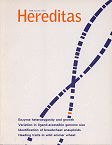
HEREDITAS
Connecting Researchers to Unrestricted Insights in GeneticsHEREDITAS, published by BMC, is a distinguished Open Access journal that has been a pivotal platform for the dissemination of cutting-edge research in the fields of genetics and biomedical sciences since its inception in 1920. With an impressive history spanning over a century, HEREDITAS has maintained a strong commitment to providing unrestricted access to high-quality scientific articles, ensuring that researchers and practitioners worldwide can share their findings and insights. This journal, which operates from its headquarters in the United Kingdom, is positioned within the Q3 quartile for Genetics and Q2 for miscellaneous Medicine categories according to the 2023 metrics, reflecting its significant yet evolving role in the academic landscape. Researchers are drawn to HEREDITAS not only for its legacy but also for its impact factor and contributions to the broader understanding of hereditary processes. The journal serves as an essential resource for students, scholars, and professionals who are keen on advancing the knowledge frontiers in genetics and related disciplines. With its open access policy implemented since 2005, HEREDITAS not only champions the principle of knowledge dissemination but also plays a crucial role in fostering collaborative research efforts across the globe.
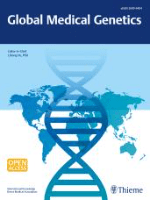
Global Medical Genetics
Transforming Healthcare Through Genetic InsightsGlobal Medical Genetics is a premier open-access journal dedicated to advancing the field of medical genetics. Published by GEORG THIEME VERLAG KG, this journal has been providing a dynamic platform for disseminating cutting-edge research and clinical findings since its inception in 2020. With the ISSN 2699-9404, it serves as an essential resource for researchers, healthcare professionals, and students who seek to explore the complex interplay between genetics and medicine. The journal aims to foster collaboration and innovation in the genetics community, addressing a diverse range of topics from genetic disorders to the application of genomics in personalized medicine. By providing open access to its content, Global Medical Genetics enhances knowledge sharing and accelerates advancements in healthcare, making it a vital asset for anyone invested in the future of genetics.
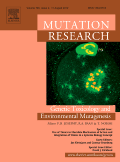
MUTATION RESEARCH-GENETIC TOXICOLOGY AND ENVIRONMENTAL MUTAGENESIS
Unraveling the complexities of mutagenic processes for a safer tomorrow.MUTATION RESEARCH-GENETIC TOXICOLOGY AND ENVIRONMENTAL MUTAGENESIS, published by Elsevier, is a renowned journal that explores critical advancements in the field of genetic toxicology and environmental mutagenesis. With an ISSN of 1383-5718 and an E-ISSN of 1879-3592, it ranks in Q3 for Genetics and Q2 for Health, Toxicology, and Mutagenesis as of 2023. This journal not only emphasizes the importance of environmental factors in genetic material alterations but also disseminates significant research findings that aid in understanding the implications for public health and safety. Operating from Amsterdam, Netherlands, it serves as a pivotal platform for researchers, professionals, and students, fostering an informed community keen on evolving the parameters of genetic research. Although it currently does not offer open access, the journal's commitment to high-quality peer-reviewed content ensures substantial contributions to the academic literature, enhancing our comprehension of mutagenic processes and their environmental triggers.
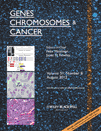
GENES CHROMOSOMES & CANCER
Innovating the Intersection of Genetics and Oncology.GENES CHROMOSOMES & CANCER, published by Wiley, is a premier journal in the intertwined fields of cancer research and genetics. With an ISSN of 1045-2257 and an e-ISSN of 1098-2264, this journal has been a significant outlet for innovative research since its inception in 1989, continuing through to 2024. Positioned in the Q2 quartile of both Cancer Research and Genetics categories in 2023, it reflects a strong impact in the scientific community, as evidenced by its Scopus rankings—99th in Genetics and 83rd in Cancer Research. Though it does not provide open access options, GENES CHROMOSOMES & CANCER offers valuable insights that foster collaboration and discovery among researchers, professionals, and students dedicated to understanding the genetic underpinnings of cancer. With its reputable standing, this journal is a vital resource for those aspiring to contribute meaningful advancements in cancer genetics and therapeutic interventions.

JOURNAL OF MEDICAL GENETICS
Pioneering Insights in Medical Genetics Since 1965.JOURNAL OF MEDICAL GENETICS, published by the BMJ PUBLISHING GROUP, stands as a premier platform in the field of genetics, focusing on both fundamental genetic research and its clinical applications. With a distinctive legacy dating back to 1965 and a significant role in advancing the understanding of genetic disorders, this journal has established itself in the top tiers with a commendable Q1 category ranking in both Genetics and Clinical Genetics as of 2023. The journal's impact is underscored by its Scopus rankings, placing it among the leading journals in the fields of medicine and genetics. Researchers and practitioners are drawn to its rigorous peer-review process and its commitment to disseminating high-quality research findings, critical reviews, and innovative clinical practices. While it is not an open-access journal, the insights provided are invaluable for anyone looking to deepen their knowledge or contribute to the burgeoning field of medical genetics.

npj Genomic Medicine
Innovating Genomic Solutions for Global Healthnpj Genomic Medicine is a leading open-access journal published by NATURE PORTFOLIO, specializing in the rapidly evolving areas of genomic medicine, including genetics, molecular biology, and clinical applications. Launched in 2016, the journal has quickly established itself within the academic community, boasting a prestigious Q1 ranking in multiple categories, including Genetics and Molecular Biology, with remarkable positions in both Scopus ranks and percentiles. With an emphasis on innovative genomic research that bridges the gap between laboratory findings and clinical implementation, npj Genomic Medicine aims to provide a platform for researchers, professionals, and students to share significant advancements and insights. Being an open-access journal enhances accessibility to cutting-edge research, ensuring that vital discoveries in genomics can benefit a global audience and facilitate interdisciplinary collaboration. The journal continues to contribute to the forefront of genomic research, impacting both academic scholarship and practical healthcare solutions.

Journal of Pediatric Genetics
Exploring the Genetic Blueprint of Childhood HealthJournal of Pediatric Genetics, published by GEORG THIEME VERLAG KG, is an essential resource in the field of pediatric medicine and genetics. With a focus on the genetic determinants of health and disease in children, this journal aims to advance the knowledge and application of genetic research in pediatric care. Although it has faced challenges in its indexing in recent years, it provides an important platform for practitioners and researchers dedicated to understanding the complexities of pediatric genetics. As evidenced by its position in Scopus ranks—ranked #209 in Pediatrics and #87 in Clinical Genetics—the journal serves a niche yet critical audience seeking to explore the interplay between genetic factors and childhood health outcomes. The Journal of Pediatric Genetics invites scholars and professionals to delve into its rich content, contributing to the ongoing discourse in this vital field, while the absence of open access highlights the journal’s curation of high-quality, peer-reviewed articles that are valued across academia and clinical practices.
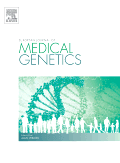
European Journal of Medical Genetics
Bridging Laboratory Discoveries with Clinical PracticeEuropean Journal of Medical Genetics, published by Elsevier, is a pivotal platform dedicated to advancing knowledge in the fields of medical genetics and its clinical applications. With an ISSN of 1769-7212 and an E-ISSN of 1878-0849, this journal fosters innovative research and insights into the genetic factors that influence human health. Ranked in the Q3 category for both Genetics and Clinical Genetics, and achieving notable recognition in Medicine (miscellaneous) with a Q2 positioning, it strives to bridge the gap between laboratory findings and clinical practice. Operating in an Open Access format, the journal aims at maximally disseminating essential findings to researchers, professionals, and students alike, ensuring that critical advances in genetics are accessible to the global medical community. With converged publication years spanning from 2005 to 2024, the journal strengthens its mission to be at the forefront of genetic research that informs clinical methodologies and fosters improved healthcare outcomes.

ARCHIVES OF TOXICOLOGY
Leading the Charge in Toxicology InnovationARCHIVES OF TOXICOLOGY is a prestigious journal published by Springer Heidelberg, dedicated to advancing research in the field of toxicology and related disciplines. With a distinguished history dating back to 1930, this journal has continuously provided vital insights and groundbreaking studies, making it a cornerstone in the areas of health, toxicology, and medicine. Recognized for its high impact, it occupies a top-ranking position in Scopus, with remarkable quartile placements in 2023, categorizing it as Q1 in Health, Toxicology and Mutagenesis, and Q1 in Medicine (Miscellaneous). The journal highlights critical research and innovative methodologies, appealing to a diverse audience of researchers, professionals, and students committed to understanding the complexities of toxic substances and their implications for public health and environmental safety. The journal does not currently offer open access, allowing for a more traditional but rigorous peer-review process that ensures the quality and integrity of every published article. Join the global discourse in toxicological science with ARCHIVES OF TOXICOLOGY, where every contribution furthers the understanding of safety and toxicity in our world.
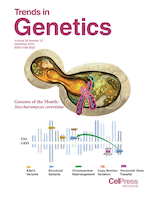
TRENDS IN GENETICS
Connecting Discoveries to the Future of GeneticsTRENDS IN GENETICS, published by CELL PRESS, is a leading journal in the field of genetics, recognized for its significant impact on research and advancements in the discipline. With an impressive Scopus ranking of #10 out of 347 in the category of Genetics and a 97th percentile ranking, this journal stands as a premier platform for publishing innovative, high-quality articles that shape the future of genetic research. Since its inception in 1985, TRENDS IN GENETICS has been at the forefront of the genetic sciences, continuously disseminating crucial findings while maintaining a strong commitment to scientific rigor and integrity. Although it does not currently offer open access options, its rigorous peer-review process ensures that only the most relevant and groundbreaking studies make it to publication. Scholars and practitioners in genetics will find this journal to be an invaluable resource for keeping abreast of the latest developments, trends, and methodologies that drive the field forward.